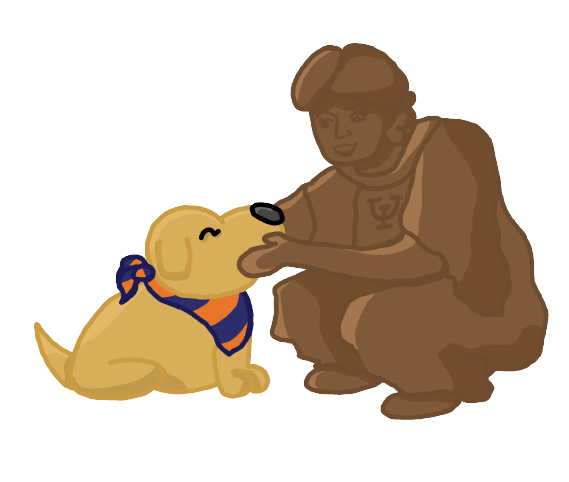Should students own dogs on campus?

Billy Galant
Oct 30, 2016
Dogs are perfect for calming academic stress

By Brandon Zegiel
About 40 percent of all households in the U.S. are home to the finest little companions around: dogs. With their long noses and furry chests, they demonstrate kindness and compassion, making them reliable and loving. So the real question is, why not open your campus home to one of these lovable creatures?
As college students, we do get busy, forcing us to be away from our homes regularly for mandatory engagements, and some, including my opponent Leah, may argue that having a dog is simply not compatible with a college lifestyle. But the reality is that if you choose the right dog, both you and your four-legged friend can have the best of both worlds.
Many dogs are independent in nature. Breeds such as Cairn Terriers and Airedale Terriers can function well without the need for constant attention, allowing you to go out, have a drink with your friends and come back home without the worry of your apartment being torn to shreds; or worse, fearing that your dog devised a master plan for escaping the house like Air Bud, and they are over at the local park working on their soccer, football or baseball skills.
Get The Daily Illini in your inbox!
And though dogs can be independent, they actually have the ability to be our best friends. This benefits their owners’ physical and emotional health, helping them smile as they walk through the doors after a long, stressful day.
And, according to various sources, dogs actually have the potential to reduce depression in humans with their natural ability to produce oxytocin, a happy chemical produced within the human brain, with their presence in caregivers’ lives. When students feel happier and safer, they are more apt to sleep better at night, making them healthier and increasing their overall focus the next day of work or class.
So yes, as a college student, you’ll probably sleep better if a dog is in the household. But what about the weekends where you are inside watching reruns of “How I Met Your Mother,” wishing you had more of a social life outside of classes?
What does a dog really do then, other than eat food and sleep in the corner?
To start, they have the ability to get you off your butt. While dogs do help to reduce depression, they also statistically increase the amount of exercise a person gets, actually promoting yet another key physical health benefit.
Now, that’s not to say that watching endless reruns isn’t a fun way to spend a weekend because sometimes that can be the very best way to do so. This is yet another key opportunity for a dog to better an individual’s life.
Wouldn’t it be better to run a Netflix marathon with your dog there to hug at the saddest moments and laugh with at the funniest? Not to mention, you have someone to share the popcorn bowl with too. Your dog won’t even judge you for crying at the end of “Titanic” for the 15th time this year.
However, let’s say you give into your dog’s wishes and take a stroll through campus town, and as a result, you end up on Sixth Street walking by many students.
This is where the dog becomes your wingman, allowing other students to give into their desires and come over to pet him or her. The world becomes a much easier place when this happens; walking the dog is one of the best ways to spread campus joy.
If you are part of the approximate 60 percent of U.S. households that have not opened their hearts and homes up to a dog, I prescribe a dog to remedy the long, stressful days of studying and the dull weekend fever.
Who knows, maybe the companion will bring more than just health benefits and possibly become one-half of a lasting friendship.
Looking for a place to start? Adoption is a great opportunity for both you and a canine friend. Please visit the Champaign County Humane Society located at 1911 E Main St. in Urbana to meet your future best friend.
Brandon is a sophomore in LAS.
Students don’t have time to properly care for dogs
 By Leah Pearlman
By Leah Pearlman
I barely have enough time to brush my teeth during the school year, hence why I wrote a column my freshman year about getting four cavities in the span of six months at the University.
In no way am I relegating you to my standards of cleanliness, or even comparing our time management skills; I am disgusting.
However, I know for a concrete fact that I am not the only student on this campus struggling to find time to take care of my basic needs. Sleeping, eating meals and even sanitizing are all necessities that college students often pass on in an effort to complete their other duties.
Some students may consider skipping lunch to continue their study session on the quiet floor of the UGL, while others may just decide after a long night of studying that an extra 15 minutes of sleep is worth it over a shower.
But owning a dog brings with it routine obligations that a student cannot simply skip past because school is getting tough.
My opponent Brandon speaks upon finding the “right” dog for a college lifestyle. This claim, as significant as it sounds, is basically impossible to put into action because no dog is the “right” type of dog for a college student to own.
Though some breeds of dogs aren’t in need of constant attention, all dogs need to undergo housetraining when they are puppies.
So if you decide to live a relatively normal college life and participate in other activities beyond your classes, you will simply not have enough time to train your dog, and especially not in the correct and humane way.
For example, according to PetEducation.com, most owners don’t know that unless you catch your puppy in the act of making an accident in the house, you should not punish him.
This kind of mistake is something that a college dog owner could consistently make simply because they don’t have time to research training techniques, as they have so much homework to do as it is.
Correct training makes a big difference when it comes to your dog’s quality of life and happiness, things that a dedicated dog owner would care about.
Plus, as puppies learn to potty train they make lots of mistakes. Training and cleaning up after a dog is not only a strain on your time, but also your resources.
Simply buying the materials to constantly clean up after your dog would be enough for me to reconsider owning one as a college student who would rather spend 15 dollars on a new iPhone case than a pack of Swiffer wipes.
But cleaning supplies don’t even begin to cover the amount of money it costs to support a dog. A dog needs food, bedding, toys and grooming, along with routine vet visits. Some owners even opt into pet health insurance.
According to RaisingSpot.com, the cost of owning a dog can start at $360 and rise to $2,520 or even more per year.
In order to keep up with these costs, some students might consider taking up a job; however, any time spent at the job just takes away from time you should be spending caring for your pup.
Some students may be able to juggle all of their responsibilities amazingly well. But no matter how much free time you have after classes, it will only be enough to cover minimal care time for your pet.
And if you do just go to class and come back home everyday to your pet, you’re likely missing out on a significant part of the college experience. College is more than class, and if you chose to own a dog while here, you will not have time for all the other activities that define the college experience.
Don’t get me wrong; I have a poster of a pug eating cake on my bulletin board in my room right now. Dogs are my everything, and also my entire phone history, but they don’t belong in small college apartments being forced to watch “Titanic” with you.
If you truly feel the need to spend more time with animals, it’s better to volunteer at a local shelter or even spend time with the therapy dogs here on campus. There is also an RSO called the Illini Service Dogs that allows students to train service dogs.
All of these options are much better than feeding your malnourished puppy some ramen just to keep him going during a particularly busy week.
Leah is a sophomore in Media and FAA.





